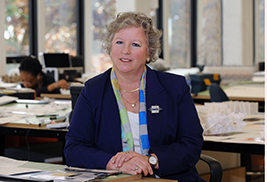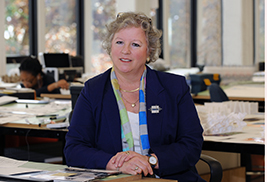Featured Article
Preventing Falls: Symposium Examines How to Keep Older Adults Healthy
Margaret P. Calkins, Ph.D., an architectural researcher, is particularly attuned to the needs of older adults whose eyesight or balance may be poor or who may live with dementia.
read morePreventing Falls: Symposium Examines How to Keep Older Adults Healthy
Posted Nov. 3, 2014 | Cindy Weiss
Margaret P. Calkins, Ph.D., an architectural researcher
who joined Kent State University this fall, has consulted
for many healthcare institutions and elderly housing
communities. Calkins is one of the featured speakers at the
inaugural Kent State Symposium on Aging that will take
place on Nov. 13 at the Kent State University Hotel and
Conference Center.
Margaret P. Calkins, Ph.D., an architectural researcher at Kent State University, is particularly attuned to the needs of older adults whose eyesight or balance may be poor or who may live with dementia. Calkins, who has consulted for many healthcare institutions and elderly housing communities, joined Kent State’s College of Architecture and Environmental Design this fall as coordinator of its Healthcare Design program. Calkins is one of the featured speakers at the inaugural Kent State Symposium on Aging, “Life in the Balance: Fall Prevention From Multidisciplinary Perspectives,” on Nov. 13 at the Kent State University Hotel and Conference Center.
The symposium is free and open to the public. Learn more and register here.
The symposium will cover leading-edge research on preventing falls in home settings, in healthcare institutions and in the community. Calkins will lecture on fall prevention in healthcare settings.
“When you think about environmental issues for people who are not completely able-bodied or able-minded, there are layers of approaches you can take,” Calkins says. These may include subtle changes in ambient lighting or using contrasting colors or making sure that the edges of stairs, chairs and countertops are clearly visible, so that the elderly can function more independently and safely.
Calkins was one of the first researchers to focus on environments for people living with dementia. She has had $6 million worth of grant funding, much of it from the National Institutes of Health.
Falls are the leading cause of death and injury among older adults, according to the Centers for Disease Control and Prevention. In Ohio, they are the No. 1 cause of injuries leading to emergency room visits, hospitalization and death for Ohioans age 65 and older, according to Bonnie K. Burman, Sc.D., director of the Ohio Department of Aging and another featured speaker at the symposium. The State of Ohio’s STEADY U program, which she will talk about, coordinates fall prevention resources around the state.
The symposium’s keynote lecturer is Laurence Z. Rubenstein, M.D., M.P.H., professor and chairman of the Donald W. Reynolds Department of Geriatric Medicine at the University of Oklahoma College of Medicine. He will provide an overview of the evidence about fall prevention in older adults. Rubenstein is the past president of the Gerontological Society of America and the author of more than 330 scientific publications.
Aging in place will be discussed by Jon Pynoos, the U.P.S. Foundation Professor of Gerontology, Policy and Planning at the Andrus Gerontology Center at the University of Southern California. He is the director of the National Resource Center on Supportive Housing and Home Modifications. His career has focused on improving services and housing so that older persons can age in place. He was a delegate to the last three White House Conferences on Aging.
Other speakers include Kent State faculty in podiatry, nursing, economics, psychology, exercise science, public health and human development and family studies and representatives of area aging, healthcare and community agencies. The symposium is sponsored by Kent State’s Division of Research and Sponsored Programs. The Ohio Department of Aging is the co-sponsor, and the Northeast Ohio Medical University is sponsoring a research poster session.
For more information about research at Kent State, visit www.kent.edu/research.
